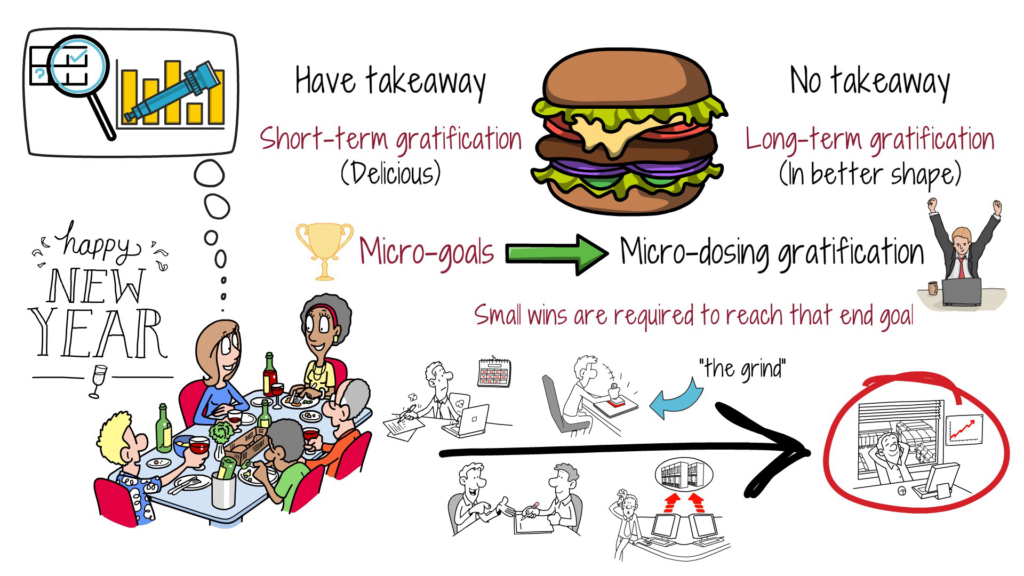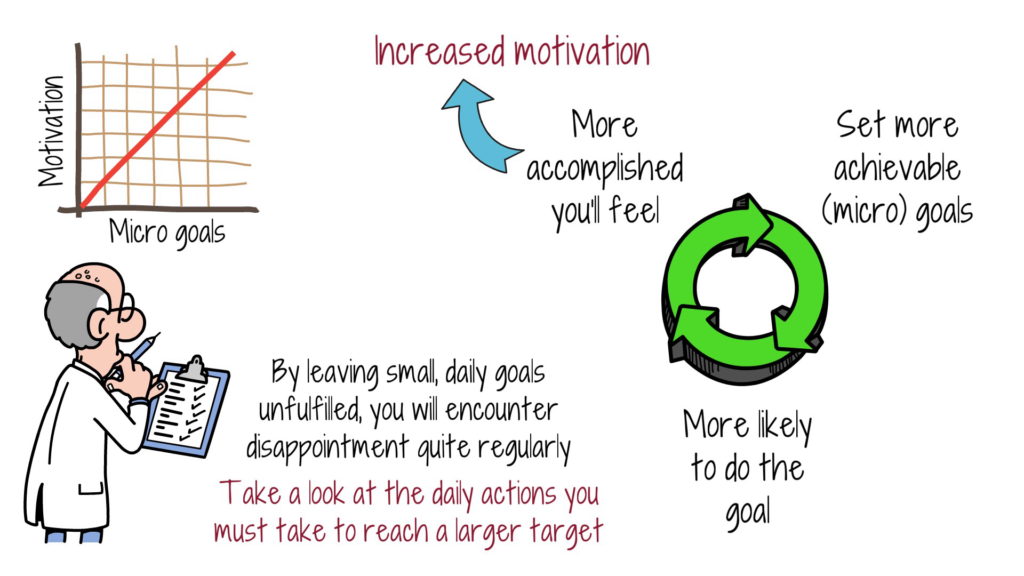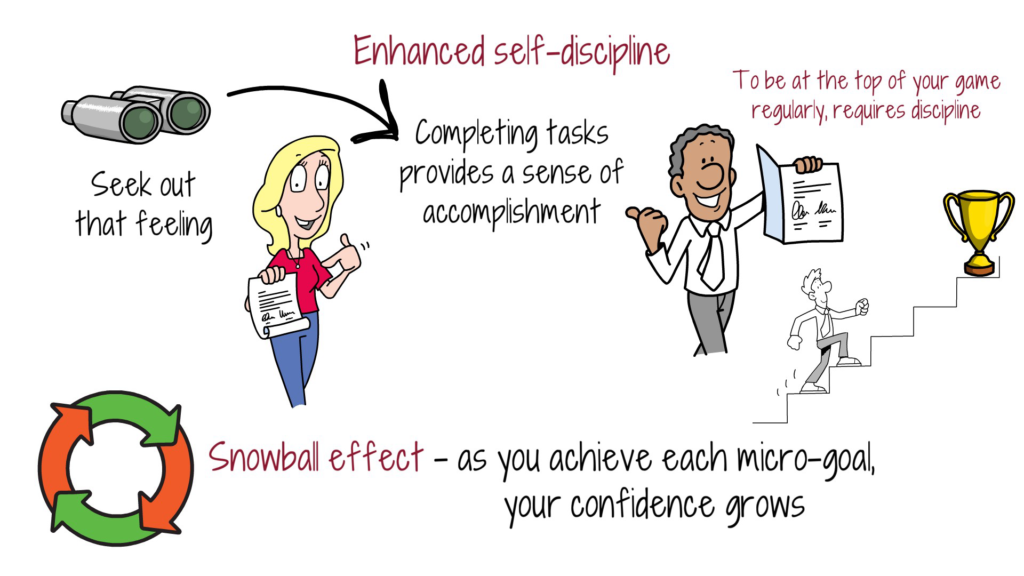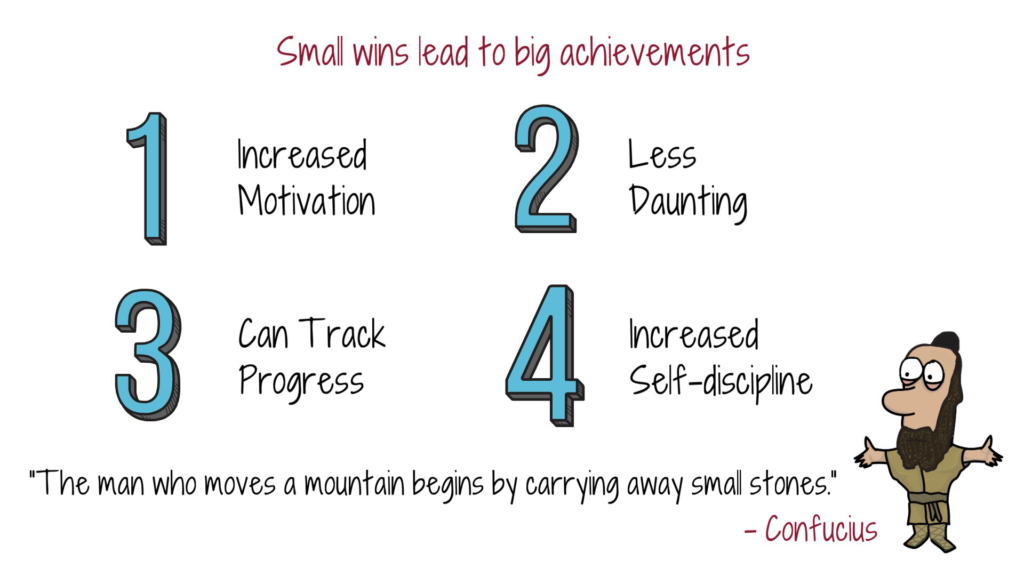Picture yourself for a moment. It’s 12:30 am on the 1st January. You and your friends are cooling off from the countdown and start thinking about the future. What goals do you have? Are they short or long-term? How achievable are they?
It’s not just when setting New Year’s Resolutions, either. We tend to focus on what the end goal looks like rather than the journey required to get there. It’s all well and good picturing yourself in your new apartment or job, but not focusing enough on the small wins required to reach that stage could prove detrimental in the long run. After all, day-to-day life doesn’t consist of big, life-changing actions. It’s the ‘grind’ – small, consistent actions that propel you towards bigger targets.

So, to keep those in mind, it’s worth remembering the difference between short-term and long-term gratification. Let’s say your goal is to get in shape for the summer. It’s challenging to turn down a delicious takeaway, for example, because the long-term gratification gained from choosing the healthy option is too far into the distance to perceive and benefit from. Short-term gratification – the taste and ease that comes with a takeaway – is immediate and therefore more desirable for your present self.
In terms of goal-setting, micro-goals are an excellent way of micro-dosing gratification. A win is a win. The feeling of achieving something in pursuit of an overarching goal helps you feel good in the short and long term – you’re winning now and setting yourself up to win later.
To put it plainly, everyone should have micro-goals in mind. Here’s how small wins lead to big achievements.
Increased motivation
As this article has already touched on, setting micro goals is pivotal for motivation levels because of how achievable they are.

Take your to-do list, for example. Although some daily tasks may not seem time-consuming, it’s not uncommon for goals, however small, to be unfulfilled. So, whether you like it or not, you will encounter disappointment quite regularly – even if it’s on a small (micro) scale. By not taking a look at the daily actions you must take to reach a larger target, you’re leaving a gaping hole of disappointment ready to swallow you up.
Setting achievable goals allows you to manage your time more effectively. When you don’t set yourself up for disappointment, you’re effectively putting motivation in a recyclable chain. The more achievable the goal, the more likely you are to do it, and the more accomplished you’ll feel – this is a gateway to increased motivation. Managing your goals and expectations allows you to trim down any excess time wasting and funnel that surplus into personal development, for example.
When you look at the blueprint for a successful life filled with significant achievements, you’ll find motivation everywhere. It’s the fuel in the engine – the more you have, the further you will go. So, when it comes to goal-setting, remember to make your goals actionable and, of course, in line with larger targets while still proving achievable. Testing yourself while consistently winning (even on a micro-scale) is the perfect way to create long-lasting, sustainable motivation.
Less daunting
Fear is one of the most significant reasons for people not succeeding with their life goals. We’re often scared to face the reality of what needs to change, and understandably so, it’s a scary, ever-changing world. Social media has also made it easier than ever to witness anyone and everyone’s big life moments, so there feels a need to hit your goals and give yourself something to brag about.

Seeing others’ success is daunting by itself. Setting huge, non-specific goals is another league altogether. When you don’t know the ins and outs of your goal – how you will contribute to it on a daily, micro level, it becomes more daunting and less achievable. A micro-goal eliminates fear’s place in your process because you can make small, regular wins.
Imagine you wake up, gather your senses and remember your big goals – get X% body fat or launch a side hustle business, for example. Targets that are impossible to achieve in one day and are daunting to contemplate on a daily basis. It’s hardly a desirable way to start the day, so to keep the dread down, keep it small and simple.
More accurate tracking
By this point in the article, you probably have an idea as to why a lack of micro-goals is damaging to your overall chances at success. Essentially, you don’t want to lose yourself, wind up losing track of your progress and potentially become dissociated with the end goal, all of which will set you much further back than intended. The further back your goal gets pushed, the less likely it is to ever be completed.

Still, it needn’t be that way. There are many benefits to setting and maintaining smaller goals in your life. One particular one that stands out is the ease at which you can track smaller goals. As this article has touched on, if a goal is too large, the necessary daily actions can feel somewhat pointless because the ultimate target does not provide the short-term gratification required for continued motivation. However, a smaller goal helps you monitor your progress.
Let’s use an example. Say you wanted to write a book. You have an idea but the only goal you’ve set is to literally, “write a book”. Every day you don’t write anything may feel like you’re falling further away from that goal, and any work you do complete risks falling into the chasm created by having a singular, colossal target. Put differently, nothing would feel worthwhile.
To counterbalance this threat and keep track of where you’re at, you could split the workload into pages or chapters – for example, “complete rough draft of 10 pages” or “plan chapter 2”. Simpler, smaller, better.
Enhanced self-discipline
Confidence is a fickle thing. It comes and goes, but one thing is certain: completing tasks provides a sense of accomplishment like no other – that feeling of inward satisfaction is one of the joys of having micro-goals. It’s a snowball effect – as you achieve each micro-goal, your confidence grows in your ability to see the larger goals come to fruition.

Regularly seeking out that feeling is a breeding ground for self-discipline. By chasing that healthy winning feeling regularly, you’re putting yourself in an arena where you must be at the top of your game consistently. That requires discipline – to show up day in, day out.
Reading this article is a form of discipline – you’re trying to learn and understand the benefits of micro-goal setting, potentially framing your mind for a more fruitful future.
Of course, if you’re self-disciplined, you’re likely going to ensure your focus levels are up to scratch. Well, with micro-goals, providing clarity on what you want to accomplish can lead to a deduction in success-reducing factors, such as distractions, procrastination and indecision because when the tasks aren’t too daunting or unclear, it becomes easier to knuckle down and move forward. Many of the aforementioned traits are a result of dread and a lack of clarity – feelings you’ll likely get from exclusively setting larger goals. Smaller goals make life feel more achievable, making it easier to focus.
Small wins lead to big achievements
So, there you have it. There are a multitude of reasons why setting small, micro-level goals lead to big achievements.

For starters, there’s increased motivation brought about by the confidence-laden feeling derived from being able to tick items off your to-do list. Secondly, small goals make everything feel less daunting. When your daily tasks are achievable, it provides belief you can keep going and continue to pursue any larger goals in the long run. Then there’s the ability to track your progress: smaller goals keep you in the present and in line with your potential achievements. Finally, the increased sense of self-discipline that comes with ticking something off your list every day is crucial for long-term success.
If there’s anything to remember from this video, it’s this quote from Chinese philosopher Confucius:
“The man who moves a mountain begins by carrying away small stones.”
One stone, one task, one goal at a time.
